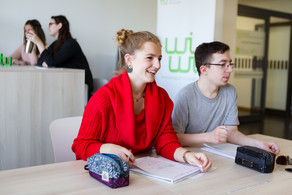FAQ - Frequently asked questions
A semester abroad involves a lot of organization and planning and therefore also a lot of questions. Answers to some of the most frequently asked questions can be found here.

Applying for a space with the department
If you click on the link to Move-On , you must first register in order to be able to log in. The rest of the application process will then run via this platform.
You will then receive an offer of a place via this platform, which you can accept or decline. If you accept the place, you can also apply for the Erasmus+ scholarship via the platform in a second step.
The following documents are required for your Erasmus application:
1. Application via the MoveON portal
Please complete the application form in full via the MoveON portal. You can specify up to three preferred universities here; however, it is also possible to choose fewer universities.
2. Letter of motivation (English, 1 to max. 3 pages)
The letter of motivation is the central element of your application. It should clearly explain your motives and convincingly highlight the following aspects:
- Your motivation for studying abroad: explain why you want to go abroad and what your personal and academic goals are.
- Discuss the universities of your choice: Show that you have researched your chosen universities in depth. Explain precisely why these universities are the right choice for you.
- Course selection and recognition: Name the courses you are particularly interested in and explain how you would like them to be recognized for your studies. You are welcome to attach an overview of the relevant courses. Further information on recognition can be found here.
- Willingness to support the Erasmus program: We always appreciate your willingness to actively support the Erasmus program, for example by writing a short experience report after your stay abroad.
3. CV
4. Current certificate of study
5. Academic transcripts:
Please attach the following certificates:
- High school diploma
- current transcript or records
- Bachelor's certificate, if you are already in the Master's program.
6. Language certificates
Enclose your language certificates. For the application, we consider, among other things
- DAAD language certificate: TU Dortmund University students can obtain this free of charge. Further information can be found here. Please note that the exam can only be taken once within 6 months.
- Language subjects in the Abitur certificate: Attendance of the basic course up to the Abitur corresponds approximately to level B2, attendance of the advanced course to level C1.
Please note: In most cases, the information in the Abitur certificate is not sufficient for the subsequent application to the host university. We strongly recommend that you obtain current and official proof, such as the DAAD language certificate, at an early stage.
7. Proof of commitment alongside your studies
Please provide evidence of relevant commitments that you are involved in alongside your studies. This includes, for example, activities in
- Clubs or student committees (an informal letter/email/screenshot is sufficient here if you are listed on team pages or similar)
- Intercultural programs (e.g. participation in your department's buddy program or offers from the International Office)
At most partner universities, we have two to four places per academic year (i.e. for the winter and summer semesters). In most cases, significantly more students apply than we have places at the respective universities. Universities in Portugal, Spain and Northern Europe are particularly popular. In these cases, we decide on the basis of the applications.
In order for your application to be considered at all, it is important that you submit your documents in full and on time.
The following criteria will then be used for further evaluation:
- Letter of motivation - is it clear that the candidate has given thought to and considered the universities of choice? Is it clear how the stay abroad fits in with the studies?
- Commitment during and alongside studies, intercultural commitment
- Relevant language skills. As a rule, this concerns knowledge of English, but knowledge of the national language can also be an advantage.
- Academic achievements
- Study phase
- Careful preparation of application documents
The language skills required by the host university can be found in the respective entries here. You must provide proof of this when applying to the host university. This is usually possible with a DAAD language certificate. When applying for an Erasmus place, you must provide credible proof of an appropriate language level, e.g. through your Abitur.
Basic knowledge of the local language is also useful. You do not have to prove this for the application. However, it will help you to find your bearings in the country. How important this is depends on the destination country. For example, host universities generally require knowledge of English. In countries where many people speak English well, such as the Netherlands or Scandinavian countries, you can usually get by with English. In countries where English language skills are less widespread, it is advisable to acquire at least a basic level (A1 - A2) in the local language through language courses before your stay.
After the application deadline, we will distribute the available places among the applications received. If there are still places available, we will announce this on our website. The available places are usually offered in February. You will then have another four weeks to apply for the available places.
If you apply after March 15 of each year, please contact the Erasmus Coordination Office first.
The allocation of places is usually announced two to a maximum of four weeks after the application deadline. You will then be contacted by us and receive a message via the MoveON portal. You have 14 days to accept or decline the offer of a place.
If we are unable to make you an offer at your preferred university, we will also contact you by email and offer alternative spaces, if possible.
If you have not been offered a place at your preferred university but have been offered another place, you can request by e-mail to be placed on the waiting list for your preferred university. You must still accept or decline the place offered within 14 days. If the place at your preferred university becomes free because someone else has canceled, we will write to you again. This will be in the week after the 14-day period has expired. If you have accepted the place offered to you, we will allow you to transfer.
Please contact the Erasmus Coordination Office by email as soon as possible.
FAQ on Learning Agreements
You should plan courses for about 30 ECTS points at the host university. It is also important that you achieve at least 15 ECTS (i.e. pass courses for 15 ECTS points), otherwise you may have to pay back the mobility grant you received.
For the sending institution - i.e. TU Dortmund University - please enter the following:
Contact Person (Administrative contact person)
Hella Koschinski, erasmus-outgoings@tu-dortmund.de
Responsible Person (signs the Learning Agreement)
Debra Hanning, erasmus.wiwi@tu-dortmund.de
You should receive the contact persons of the receiving institution from the host university.
Generally, the ECTS credits for a course taken abroad don't have to perfectly match those at our faculty.
Here's the basic rule: If a course abroad covers at least 80% of the ECTS credits of our corresponding course, recognition is straightforward.
-
Example: Most of our courses are worth 7.5 ECTS. Therefore, courses with at least 6 ECTS credits from abroad can usually be recognized without any issues (6 ECTS = 80% of 7.5 ECTS).
Special Cases and Exceptions:
-
Up to two exceptions: You can get credit for up to two courses from abroad with at least 5 ECTS credits for our WiWi (Business and Economics) courses worth 7.5 ECTS.
-
Further exceptions and individual review: If you wish to have additional courses with less than 80% of the required ECTS credits recognized beyond these two exceptions, an individual case review will take place. For this, please contact the Examination Office directly. They will assess whether recognition is possible in your specific situation.
-
Tip: In these cases, try to combine two courses abroad that are thematically relevant to one course here.
-
Important: You must decide how the courses will be combined before the recognition process, not after receiving your grades.
-
Specific Example: You want to recognize an Entrepreneurship course (5 ECTS) from abroad for one of our 7.5 ECTS courses. You could combine it with a second, thematically similar course (e.g., Innovation Management) from abroad. In this scenario, the 5 ECTS course could be weighted 2/3 and the other course 1/3 to reach the 7.5 ECTS.
In many cases, the Learning Agreement must be ready only a few weeks before the stay, or no deadline is set (however, it must be ready before the mobility, i.e. signed by all three parties). In some cases, however, the Learning Agreement must be handed in with the application. If this is the case for you and you cannot take care of the recognition in time, you can leave table B blank for the time being (or enter "0" in the online Learning Agreement).
The Learning Agreement can still be changed later by adding the corresponding courses in table B2 "Under the mobility".
In these cases, please contact the Departmental Erasmus Coordinator.
Yes. This does not always have to be done immediately; it can make sense, especially at the beginning of the lecture period at the host university, to wait a bit and thus, if possible, only have to change the Learning Agreement and request the signatures of all parties once.
European Student Identifier (ESI) - A digital identifier that allows students to uniquely identify themselves when accessing student mobility services online. The TU does not currently use this, so students can leave this field blank when filling it in.
Certain course areas are defined in the inter-institutional agreements between the universities that facilitate the exchange. An ISCED code (International Standard Classification of Education) is used for this purpose.
In our partnerships, we usually use 0311 - Economics or 0410 - Business and administration, not further defined, but others are also possible.
You can find the correct codes for your partner university in the overview of partnerships on the pages of the International Office. There you can search for your host university and then find the ISCED code under "more details".
FAQ on Recognition Agreements
When we recognize credits earned abroad, we focus on a few key criteria to ensure fairness and academic equivalence. The formal check follows this scheme (in German).
1. Comparability of Courses
The course you take at your host university should be comparable in content and scope to the corresponding module at TU Dortmund for which you want to receive credit.
-
ECTS Credits: A straightforward recognition is possible if the foreign course covers at least 80% of the ECTS credits of the TU Dortmund course. Since most of our courses are worth 7.5 ECTS, this generally means the foreign course should have at least 6 ECTS credits.
-
Exam Format: The exam format should also be comparable.
2. Recognition with Deviating ECTS Credits
We understand that ECTS points might not always match perfectly. Here's how we handle those cases:
-
You can get credit for up to two courses with 5 or 5.5 ECTS credits for a single 7.5 ECTS course here.
-
If you want to get credit for additional courses with fewer than 6 ECTS beyond these two exceptions, we'll conduct an individual case review. For this, please contact the Departmental Examination Office directly. They'll assess whether recognition is possible in your specific situation.
3. Recognition of Master's and Bachelor's Modules
-
Master's courses can generally be recognized as Bachelor's modules.
-
The reverse is only possible in exceptional cases. This includes situations where the Bachelor's program at the host university is designed for 4 years and 240 ECTS.
-
If you believe your situation might be an exceptional case, please also reach out to the Departmental Examination Office.
Generally, the ECTS credits for a course taken abroad don't have to perfectly match those at our faculty.
Here's the basic rule: If a course abroad covers at least 80% of the ECTS credits of our corresponding course, recognition is straightforward.
-
Example: Most of our courses are worth 7.5 ECTS. Therefore, courses with at least 6 ECTS credits from abroad can usually be recognized without any issues (6 ECTS = 80% of 7.5 ECTS).
Special Cases and Exceptions:
-
Up to two exceptions: You can get credit for up to two courses from abroad with at least 5 ECTS credits for our WiWi (Business and Economics) courses worth 7.5 ECTS.
-
Further exceptions and individual review: If you wish to have additional courses with less than 80% of the required ECTS credits recognized beyond these two exceptions, an individual case review will take place. For this, please contact the Examination Office directly. They will assess whether recognition is possible in your specific situation.
-
Tip: In these cases, try to combine two courses abroad that are thematically relevant to one course here.
-
Important: You must decide how the courses will be combined before the recognition process, not after receiving your grades.
-
Specific Example: You want to recognize an Entrepreneurship course (5 ECTS) from abroad for one of our 7.5 ECTS courses. You could combine it with a second, thematically similar course (e.g., Innovation Management) from abroad. In this scenario, the 5 ECTS course could be weighted 2/3 and the other course 1/3 to reach the 7.5 ECTS.
Must the recognition agreement be signed by the Departmental Examination Office before the mobility?
No, the formal check of the courses in question can take place after the mobility. However, it is certainly better for everyone involved to know about any problems beforehand.
Furthermore, you can only enter courses in Table B of your Learning Agreement for which you have a signature from the relevant Teaching and Research Area and from the Departmental Examination Office.
In many cases, the Learning Agreement must be ready only a few weeks before the stay, or no deadline is set (however, it must be ready before the mobility, i.e. signed by all three parties). In some cases, however, the Learning Agreement must be handed in with the application. If this is the case for you and you cannot take care of the recognition in time, you can leave table B blank for the time being (or enter "0" in the online Learning Agreement).
The Learning Agreement can still be changed later by adding the corresponding courses in table B2 "Under the mobility".







